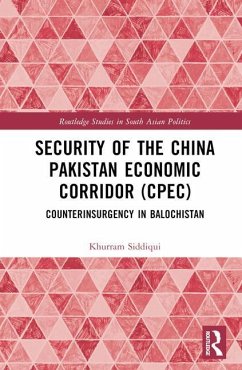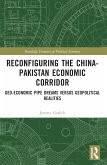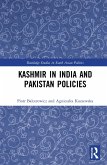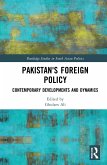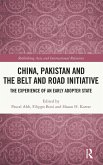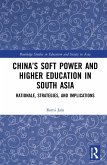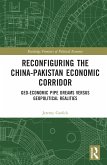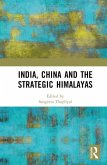This book analyses the strategic and economic significance of the China-Pakistan Economic Corridor (CPEC), with a particular focus on the region of Balochistan. Given the history of multiple insurgencies that the Pakistani Military has confronted in Balochistan, the book examines the region's intricate conflict ecosystem and security landscape, which poses potential threats to the CPEC.
Structured chronologically, the book traces the evolution of the Pakistani Army's counterinsurgency practices inherited in 1947 from the British Indian Army's culture of fighting small wars through to the contemporary counterinsurgency (COIN) adaptation in the "war on terror", and afterwards, to the fifth round of the Balochistan insurgency. The analysis centres on the development of counterinsurgency theory and practice by the Pakistani Army. It empirically investigates the efficacy of the COIN strategy in Balochistan. The author argues that the approach significantly changed after conceptualising the doctrine, especially from 2016 onwards, from "butcher and bolt" to the inclusion of critical components like political primacy, affect-based, and focused use of force, "winning hearts and minds" and rules of engagement. As a result, there was reduced violence and an increased number of insurgent surrenders. This book concludes that the Pakistani Army has largely controlled the insurgency in Balochistan. However, simultaneously, there is an urgent need to reduce tangible support to the insurgents through porous borders and implement an effective strategy to sever the nexus between the Islamic State of Khorasan (ISKP) and the Baloch insurgent organisations, as well as the sectarian militant organisations in Balochistan province. This is crucial to ending the insurgency and ensuring the security of CPEC.
A novel contribution to the study of counterinsurgency and the importance of CPEC to China's foreign policy and diplomacy, as well as its effects on the conflict dynamics in Balochistan, the book will be of interest to researchers studying War and Conflict Studies, Terrorism Studies, International Relations, Security and Strategic Studies, and South Asian and Chinese Studies.
Structured chronologically, the book traces the evolution of the Pakistani Army's counterinsurgency practices inherited in 1947 from the British Indian Army's culture of fighting small wars through to the contemporary counterinsurgency (COIN) adaptation in the "war on terror", and afterwards, to the fifth round of the Balochistan insurgency. The analysis centres on the development of counterinsurgency theory and practice by the Pakistani Army. It empirically investigates the efficacy of the COIN strategy in Balochistan. The author argues that the approach significantly changed after conceptualising the doctrine, especially from 2016 onwards, from "butcher and bolt" to the inclusion of critical components like political primacy, affect-based, and focused use of force, "winning hearts and minds" and rules of engagement. As a result, there was reduced violence and an increased number of insurgent surrenders. This book concludes that the Pakistani Army has largely controlled the insurgency in Balochistan. However, simultaneously, there is an urgent need to reduce tangible support to the insurgents through porous borders and implement an effective strategy to sever the nexus between the Islamic State of Khorasan (ISKP) and the Baloch insurgent organisations, as well as the sectarian militant organisations in Balochistan province. This is crucial to ending the insurgency and ensuring the security of CPEC.
A novel contribution to the study of counterinsurgency and the importance of CPEC to China's foreign policy and diplomacy, as well as its effects on the conflict dynamics in Balochistan, the book will be of interest to researchers studying War and Conflict Studies, Terrorism Studies, International Relations, Security and Strategic Studies, and South Asian and Chinese Studies.
"In this book Khurram Siddiqui masterfully explains the evolution of the Pakistani counter-insurgency approach in Balochistan, whilst offering important insight on how the recent extension of the China-Pakistan Economic Corridor through the region has impacted violence there. Crucially, the book traces the alliance formation between Islamic State, the Balochistan Liberation Army (BLA) and Lashkar e Jhangvi (LeJ) and explores how these alliances have posed a threat to the security of the Chinese Belt and Road Initiative in Balochistan. This area is highly under researched and equally crucial for regional and global security. Siddiqui's firm grip on the strategies of all combatants, combined with a full account of the recent history of insurgency in the area, makes this a valuable book for those wanting to understand both the Pakistani military's response to sub-state violence as well as the security implications of CPEC."
--Professor Andrew Mumford, FRHistS, Professor of War Studies, School of Politics and International Relations, University of Nottingham, UK
"The book comprehensively examines the conflict ecosystem in Balochistan, Pakistan, and its impact on the China-Pakistan Economic Corridor. It explores the Pakistani Army's COIN doctrine and its effectiveness in countering insurgencies. The book also studies the convergence of ideology among militant organisations like Lashkar-e-Jhangvi, the Baloch Liberation Army, and the Islamic State of Khurasan in Balochistan, posing a threat to Chinese investment in CPEC. Siddiqui's knowledge and critical analysis of the strategy of all sides in the conflict and the area's insurgency history make this book crucial in comprehending the Pakistani military's response to sub-state violence and the security implications of CPEC."
--Tahir Abbas, FAcSS, Professor Radicalisation Studies, Institute of Security and Global Affairs, Leiden University, The Hague, The Netherlands
"Khurram Shahzad Siddiqui's monograph makes an important contribution to the literature on Pakistan's approach to counterinsurgency warfare which has, to date, remained understudied. The book stands out for its sound theoretical grounding, extensive research and in-depth, context-based regional knowledge. With its empirical focus on the security of the China Pakistan Economic Corridor, it has a wide cross-disciplinary appeal to anybody with a stake in Pakistani and Chinese area studies, contemporary warfare and international relations. It is essential reading for academics, practitioners and the wider reading public with an interest in these subjects."
--Bettina Renz, Professor of International Security, School of Politics and International Relations, University of Nottingham, UK
"This is a highly original study of the political and security impact of CPEC in Balochistan. The author has a forensic socioeconomic understanding of the region as well as Pakistan and China's wider security policies and interests. His appreciation of the drivers of the Baloch insurgency, and the Pakistani military's response to that conflict, is compelling and convincing. This book is a major contribution to South Asian studies; it throws much-needed light on the complex effects of one of China's most important and costly investments in the region. It will also be of significant value to scholars of terrorism and insurgencies."
--Dr. Edward Burke, Assistant Professor in War Studies, University College Dublin, Ireland
"Dr Siddiqui's work breaks new ground in examining the Pakistan military's evolving counter-insurgency response in the region. The volume is an essential resource for both considering the security threats to the implementation of CPEC and how its extension into the poverty ridden Balochistan region has impacted long-standing resistance to the Pakistan state. [...] Security of the China Pakistan Economic Corridor provides an important contribution to the understanding of the security perceptions, concerns and Pakistan state responses relating to the CPEC project. The author offers fresh insights into the latter based on interviews and close readings of official documents. The information is valuable for scholars, students and interested readers alike."
--Ian Talbot, Emeritus Professor in the History of Modern South Asia, University of Southampton, UK, in The Friday Times.
--Professor Andrew Mumford, FRHistS, Professor of War Studies, School of Politics and International Relations, University of Nottingham, UK
"The book comprehensively examines the conflict ecosystem in Balochistan, Pakistan, and its impact on the China-Pakistan Economic Corridor. It explores the Pakistani Army's COIN doctrine and its effectiveness in countering insurgencies. The book also studies the convergence of ideology among militant organisations like Lashkar-e-Jhangvi, the Baloch Liberation Army, and the Islamic State of Khurasan in Balochistan, posing a threat to Chinese investment in CPEC. Siddiqui's knowledge and critical analysis of the strategy of all sides in the conflict and the area's insurgency history make this book crucial in comprehending the Pakistani military's response to sub-state violence and the security implications of CPEC."
--Tahir Abbas, FAcSS, Professor Radicalisation Studies, Institute of Security and Global Affairs, Leiden University, The Hague, The Netherlands
"Khurram Shahzad Siddiqui's monograph makes an important contribution to the literature on Pakistan's approach to counterinsurgency warfare which has, to date, remained understudied. The book stands out for its sound theoretical grounding, extensive research and in-depth, context-based regional knowledge. With its empirical focus on the security of the China Pakistan Economic Corridor, it has a wide cross-disciplinary appeal to anybody with a stake in Pakistani and Chinese area studies, contemporary warfare and international relations. It is essential reading for academics, practitioners and the wider reading public with an interest in these subjects."
--Bettina Renz, Professor of International Security, School of Politics and International Relations, University of Nottingham, UK
"This is a highly original study of the political and security impact of CPEC in Balochistan. The author has a forensic socioeconomic understanding of the region as well as Pakistan and China's wider security policies and interests. His appreciation of the drivers of the Baloch insurgency, and the Pakistani military's response to that conflict, is compelling and convincing. This book is a major contribution to South Asian studies; it throws much-needed light on the complex effects of one of China's most important and costly investments in the region. It will also be of significant value to scholars of terrorism and insurgencies."
--Dr. Edward Burke, Assistant Professor in War Studies, University College Dublin, Ireland
"Dr Siddiqui's work breaks new ground in examining the Pakistan military's evolving counter-insurgency response in the region. The volume is an essential resource for both considering the security threats to the implementation of CPEC and how its extension into the poverty ridden Balochistan region has impacted long-standing resistance to the Pakistan state. [...] Security of the China Pakistan Economic Corridor provides an important contribution to the understanding of the security perceptions, concerns and Pakistan state responses relating to the CPEC project. The author offers fresh insights into the latter based on interviews and close readings of official documents. The information is valuable for scholars, students and interested readers alike."
--Ian Talbot, Emeritus Professor in the History of Modern South Asia, University of Southampton, UK, in The Friday Times.

